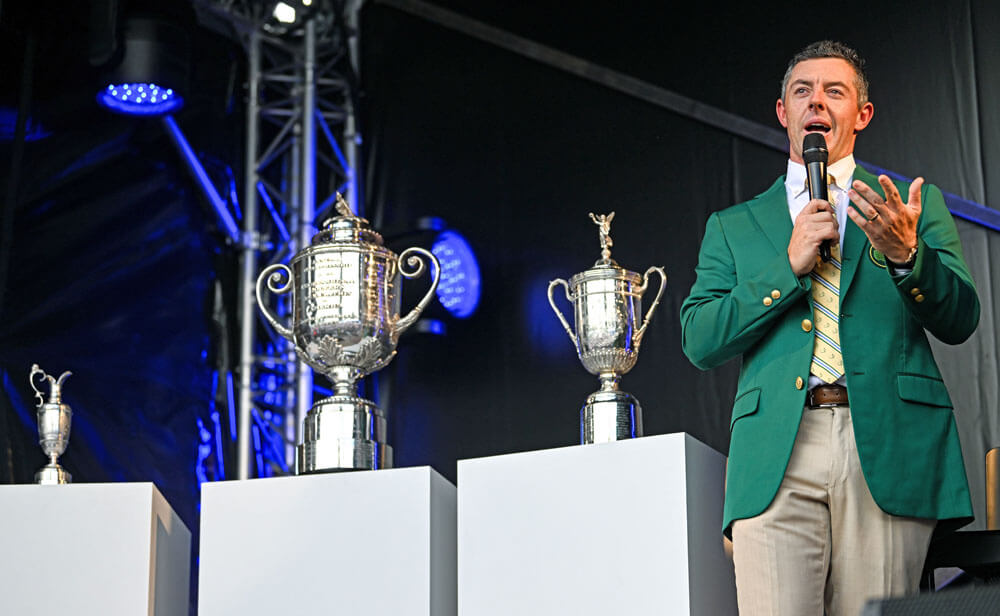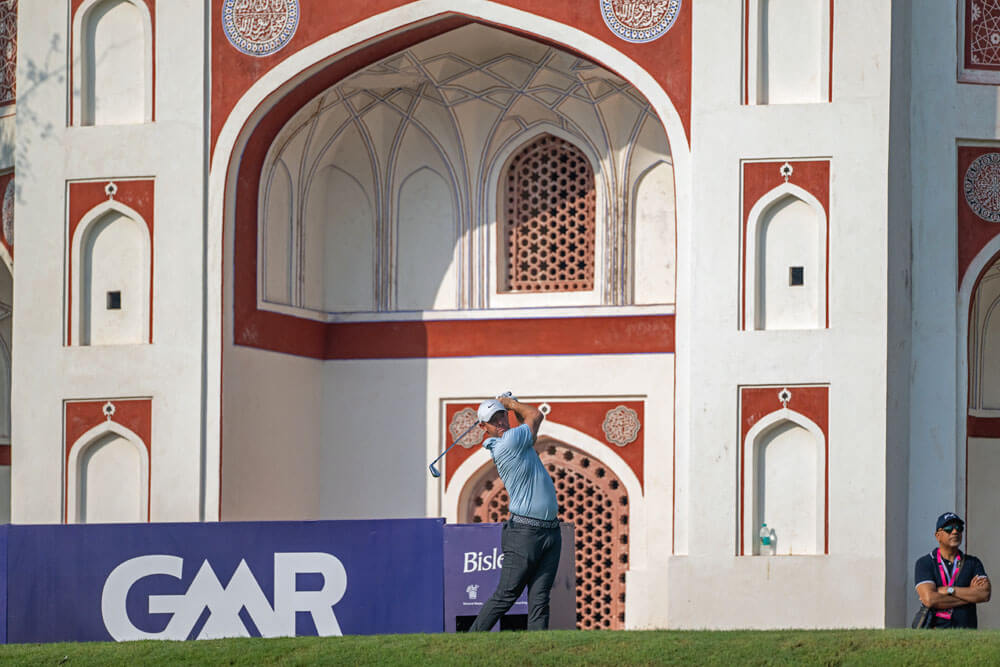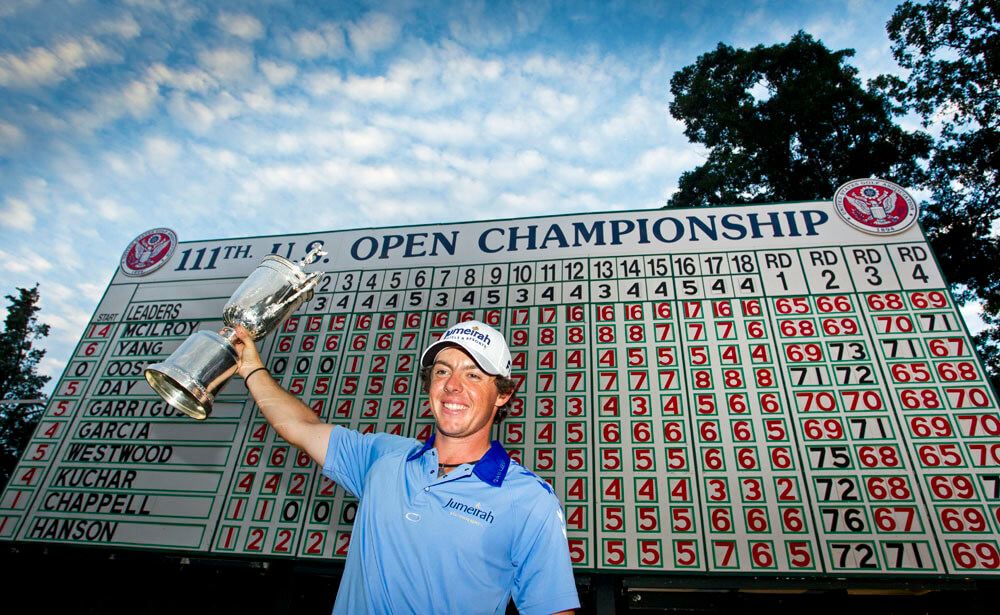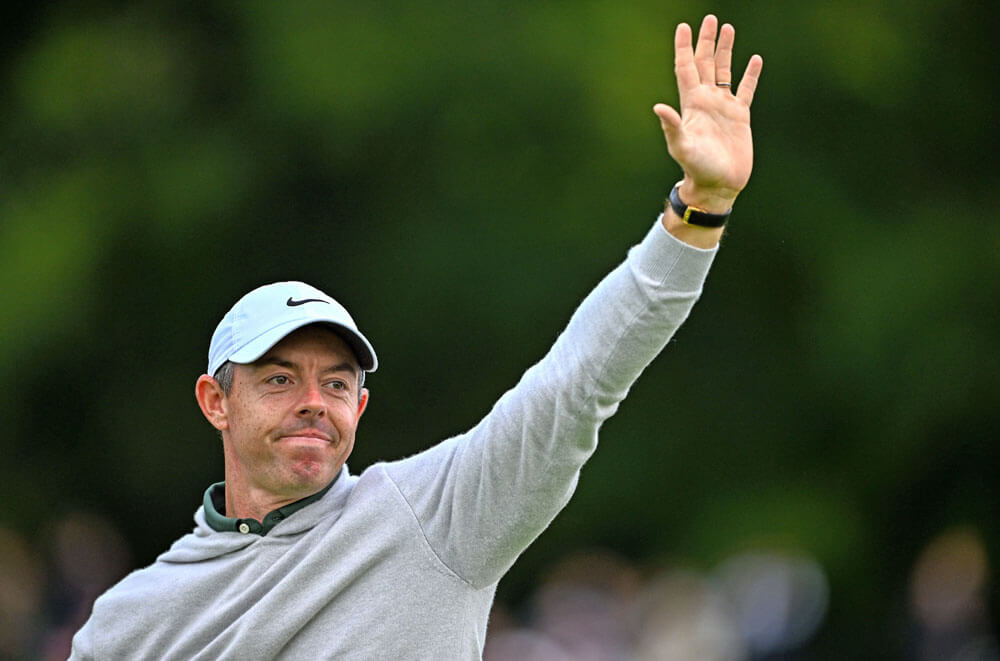Rory McIlroy was bewildered.
Happily bewildered, but bewildered nonetheless.
“Grinding on the range for three or four hours every day is maybe a little tougher than it used to be,” he said in June at the RBC Canadian Open. A week later, ahead of the U.S. Open, he said: “You dream about the final putt going in at the Masters, but you don’t think about what comes next.” Asked if he’d come up with a plan for “Phase 2 Rory”, he conceded: “I don’t have one. I have no idea.”
Two months had passed since he achieved a triple crown, of sorts – Masters victory, first major title since 2014, the completion of the career Grand Slam.
He had done the Great Big Thing. He’d slain the beast. It was over now; he could relax. And yet he knew he was entering uncharted territory.
Oscar Wilde said there are two great tragedies in life: not getting what you want and getting it. For Olympic medal winners, that means the “post-Olympic blues” – a fugue that leaves them aimless in the aftermath of a four-year cycle chasing a goal. Now what? McIlroy, in the green afterglow of Augusta, sounded like them.
Ah, but this is McIlroy we’re talking about. He’s used to introspection. And just a few weeks later at the Scottish Open, the Northern Irishman was clear he’d made progress.
“It’s amazing what two weeks of detachment can do for you, sitting there being with your own thoughts for a while,” he said. “I don’t want [the Masters victory] to be my last great moment in the game. There’s plenty more that I can do, so many opportunities that lie ahead, whether that’s Royal Portrush next week or the Open going back to St Andrews or a U.S. Open at Pebble Beach. Great venues that all the greats have won on. I’d love to add my name to those lists.”
 Rory McIlroy, wearing the green jacket he received after winning The Masters in April, stands with trophies from the other three majors, all of which he has won: (from left) the Open Championship, the PGA Championship and the U.S. Open. Ramsey Cardy, Sportsfile via Getty Images
Rory McIlroy, wearing the green jacket he received after winning The Masters in April, stands with trophies from the other three majors, all of which he has won: (from left) the Open Championship, the PGA Championship and the U.S. Open. Ramsey Cardy, Sportsfile via Getty Images
He didn’t contend at the Open on home soil but his top-10 finish was a welcome contrast to Royal Portrush’s return to the Open rota in 2019 when he missed the cut. Over the summer’s remaining weeks he sharpened his game for Europe’s successful quest to win the Ryder Cup at Bethpage Black. (Winning a road Ryder Cup was the second of his three stated remaining goals for his career. The third goal, still out there unfulfilled, is to win an Olympic medal.)
And yet there is still more to do. The final target for 2025 is to win this week’s DP World Tour Championship for a fourth time. That would also give him a seventh Race to Dubai title, which would leave him one short of Colin Montgomerie’s record tally. The accomplishment would further redirect the public’s attention to the legacy of McIlroy, whose five major championship victories are one short of Nick Faldo’s career total; the tag of Best Ever from Europe is very much in play. Keep in mind, McIlroy is still just 36.
What he thinks of all this is, as always, an open question, for speculating about McIlroy’s ever-changing motivations has become one of golf’s most popular parlor games. “Phase 2 Rory” remains both an unclear concept and also very familiar because McIlroy’s career has had more resets than an old laptop. By their nature, elite athletes must be forever identifying new quests. What makes McIlroy distinct is that he is a born seeker and voracious reader, and has been bracingly frank as he continues to evolve.
He’s changed his mind about the Ryder Cup, TPC Sawgrass, Pete Dye designs, Wentworth, and the Olympics, to name just a few. On each occasion there has been a similar pattern: bold statement, stubborn defence of it, analysis, and then more talk about how he’s been reviewing the situation.
What’s more, during the 11-year gap between his fourth and fifth major victories, he turned in all sorts of directions before settling on Stoicism, the Hellenistic school of thought that promotes virtue, reason and inner peace. His journey to that philosophical destination was frequently discussed in a manner Tiger Woods would never have undertaken. Which is not to say that Woods never considered the meaning of life, just that, if he did, he kept it to himself. McIlroy is different.
“Rory is erratic but erratic in an endearing way. His
self-awareness is both his superpower and his Kryptonite: it propels his ups and compresses his downs.”
— Timothy M. Gay
Timothy M. Gay, author of the biography “Rory Land,” has spent years observing all of it. “If I had a dollar for every ‘McIlroy is Resetting His Priorities’ article that has been written in the past 15 years, I could take everyone I know out for fish and chips and multiple rounds of Guinness,” Gay said. “I have three-ring binders literally full of those pieces.
“But beyond their platitudes,” he continued, “they point to the quality that I admire the most and explored in the book: his capacity to reinvent himself, to look within to reignite his competitive fire. Hogan, Nicklaus, and Woods burned hot all the time. They were maniacally focused for almost every big championship. Rory is built differently.
“Rory is erratic but erratic in an endearing way. His occasional lack of focus has driven Jack Nicklaus to distraction over the years, but it makes Rory more human, more relatable. He admits to emotional frailties, to experiencing moments of self-doubt, on and off the course. He’s constantly looking to sharpen his intellectual and emotional faculties, citing this book or that motivational tract. His self-awareness is both his superpower and his Kryptonite: it propels his ups and compresses his downs.”
Paul McGinley, McIlroy’s Ryder Cup captain in 2014 and now a respected Golf Channel analyst, made similar points to the BBC in September.
“Rory is charismatic, dynamic in how he plays, a risk-taker and he draws people in because he plays in the Arnold Palmer style,” McGinley said. “He is more hit-and-miss than a Scottie Scheffler, who plays the percentages. I don’t know if Rory will ever lead the world rankings again because he doesn’t have the consistency Scottie has.”
McGinley likes to highlight that McIlroy is at his best with something to prove, when he has “pointy elbows.” At the BMW PGA Championship at Wentworth, Second Wind asked McGinley what brings those elbows out. McGinley paused, raised eyebrows, tilted his head, and laughed. “That’s the big question, isn’t it?!”
 Rory McIlroy played in India for the first time in October at the DP World India Championship in New Delhi. Jason Butler, Getty Images
Rory McIlroy played in India for the first time in October at the DP World India Championship in New Delhi. Jason Butler, Getty Images
His comparison with Scheffler is intriguing, not least because of the very different comments the world’s two best golfers uttered about achievement in 2025. While McIlroy was telling The Guardian that “when you have had a goal for so long and you achieve it, it just takes a little time to reset some goals,” Scheffler was stunning the golf world ahead of the Open by saying that winning, “isn’t the be all and end all,” and golf is “not a fulfilling life.”
Before he’d won on the PGA Tour, Scheffler told the Netflix series “Full Swing,” “Golf was too important to me. That’s kind of where I placed my identity for a long time. I try not to change too much, but I needed to change something.”
Might McIlroy make a similar gear change? He sounded like it in the wake of his Masters triumph. “I burdened myself with the career Grand Slam stuff,” he said, “and now I want to enjoy the last decade or whatever of my career.”
With that in mind his end-of-2025 schedule has already included a visit to the DP World India Championship, and in December he will play in the Australian Open. Announcing that you’re off to India and Australia is far from unusual for somebody in need of a time out, of course. Backpackers do it, burnt-out baby boomers do it, even the Beatles did it.
At Wentworth, Second Wind asked McIlroy if, after 20 years on the amateur and professional hamster wheel, he felt that his travel plans are a golfing version of such breaks from the norm? He nodded with meaning at mention of the hamster wheel and then expanded on his new outlook. “I want to go and play in different places in the world, and experience things that I haven’t experienced before,” he said. “India for the first time – that excites me. I don’t want to name a tournament, but when you’re going back to the same place and experiencing the same thing 15 or 20 years in a row, it can get a little bit monotonous and a little bit tedious.
“I don’t want to be grinding out here at 50 years of age.
I’ll turn up and play the majors and have a nice time but whenever I’m done, I’m done.”
— Rory McIlroy
“I had a chat with Roger Federer a few years ago at the end of his career,” he continued. “He was saying he wanted to go and play a lot of the places he could never play at his peak, some of the smaller events where not a lot of people had seen him play. I think as time goes on and I get to this stage of my career, I get excited about doing that sort of thing. At this point I want to play golf when I want to play golf. I want to play in the locations that I love to go to, and I want to play the majors and the Ryder Cup. That’s it. I’m not going to be scheduling [myself] by minimum starts or anything else. I’ll obviously do my bit to make sure I keep my membership on certain tours, but I’m going to play where I want to play.”
Was he really, at just 36, discussing the back nine of his career?
“Absolutely,” he said. “I don’t want to be grinding out here at 50 years of age. I’ll turn up and play the majors and have a nice time but whenever I’m done, I’m done. That’s certainly not right now, but I’m certainly closer to that point now than I was in 2007 when I turned pro.”
 Rory McIlroy moved from Florida to England with wife Erica and daughter Poppy. Ramsey Cardy, Sportsfile via Getty Images
Rory McIlroy moved from Florida to England with wife Erica and daughter Poppy. Ramsey Cardy, Sportsfile via Getty Images
A picture of Rory 2.0 was emerging and it was apt that he was at Wentworth to discuss it. He has purchased a new property on the leafy estate in Surrey, near London, and while he has been reluctant to reveal the motivation for the move, it is widely believed to be a location (and climate) his wife, Erica, prefers to Florida. A British education also appeals for their daughter, Poppy, now of school age.
It’s natural to wonder whether the move was also motivated by the situation in America, where McIlroy advocated for the PGA Tour only to be hung out to dry by the tour executives who engaged in talks with LIV Golf. And DP World Tour colleague Eddie Pepperell, on “The Chipping Forecast” podcast, wondered about McIlroy having been the focus of so much fan fury at the Ryder Cup.
“How does he feel about the future?” Pepperell said. “Is Rory thinking I can’t wait to play golf in America next year – or will I play less? His wife couldn’t wait to go back to Wentworth, and she’s American. I bet she couldn’t wait to get out of there.
“In my mind Rory would be within his rights to say that he could do without America for a while,” he added. “Rory is a big star and he is going to want to play more in Europe, and globally, so he doesn’t have to deal with some of that s***.”
Not everyone delights in the question of what happens next – Shane Lowry has had to put a stop to endless questions about his friend. Like the straight man in a comedy double act, he’d become tired of being asked why his partner is the funny one. But the Irishman has an intimate knowledge of what drives McIlroy.
“He’s done everything in the game, he completed that in April,” Lowry said. “But his constant drive, his work ethic, is admirable.”
McIlroy has always been a global player. The DP World Tour schedule continues to appeal in January (in Dubai), July (on the linksland), September (where the tour now has a genuine sweet spot of excellent events) and November (Middle East again). But he’ll still play the PGA Tour, where he is the only player to win the FedEx Cup three times. He also has many business interests, not least the TGL indoor golf league, to keep him occupied Stateside. With his admirable curiosity, rare perspective and signature self-awareness, his theories about legacy are subtly distinct from those who have been in his position in the past.
Back in 2012 Nick Faldo instructed McIlroy to focus on golf ahead of his love life and other distractions. Tour insiders tell of how McIlroy watched this analysis on television and said that he didn’t want to be someone whose off-the-course life was ruined by on-the-course ambitions; that he was willing to sacrifice some success in the latter in order to be fulfilled and happy in the former.
This point was quietly reiterated when, at the PGA Championship at Quail Hollow in May, he discussed how many major championships he might ultimately win.
“Numbers tell one story,” he said, “but it mightn’t be the full story.”
 The first leg of Rory McIlroy’s career Grand Slam came with his victory at the 2011 U.S. Open at Congressional. John Mummert, USGA
The first leg of Rory McIlroy’s career Grand Slam came with his victory at the 2011 U.S. Open at Congressional. John Mummert, USGA
For Faldo and Woods, the win total was the be all and end all; each created a wall between himself and his peers. Contrast that with McIlroy saying in the last two Ryder Cups that he wants younger teammates to “look across at me, not up.”
It is an attitude that doesn’t impress everyone. Where’s the wall? But for McIlroy, there is no wall; there never has been. Here is a man trying to win, yes, but also to negotiate a path towards the greatest prize of them all: happiness.
In that sense, another result from 2025 was telling: his victory in September’s Irish Open, achieved amid delirious scenes at the K Club near Dublin. McIlroy has had a mixed relationship with the Irish public, struggling with the outsized acclaim and adulation, but there seems little doubt that the love now flows in both directions and that McIlroy is more comfortable in his own skin. It adds to the idea that a more relaxed McIlroy has the potential to be a more dangerous one.
His return to Augusta National in April will be the focus of more furious attention, yet McIlroy’s base level is high: In the 12 major championships before he finally broke through at the Masters he finished in the top three four times. Replacing a straitjacket with a green one might turn those near-misses into victories.
Another two major championship wins would take him past Faldo’s modern European-best total of six, and author Gay understands the temptation of that number.
“Faldo has been critical – perhaps too critical – of Rory over the years,” Gay said. “He probably won’t say it out loud, but surpassing Faldo and becoming Europe’s leading major winner would mean a great deal to him.”
Ewan Murray, The Guardian’s golf correspondent, adds a note of caution, however.
“He’s just come out of a cycle where a Holy Grail was such a draining discussion point,” Murray said. “Why would he want to generate another one straight away?”
It’s a point you can imagine Federer making, or even Marcus Aurelius. As McIlroy makes the turn on his career, heading into the back nine and blinking in his all-new mental terrain, you get the sense he has considered all of it, and more.
Top: Rory McIlroy is comfortable with the idea of his career being closer to the end than the beginning. Ramsey Cardy, Sportsfile via Getty Images
© 2025 Global Golf Post LLC
